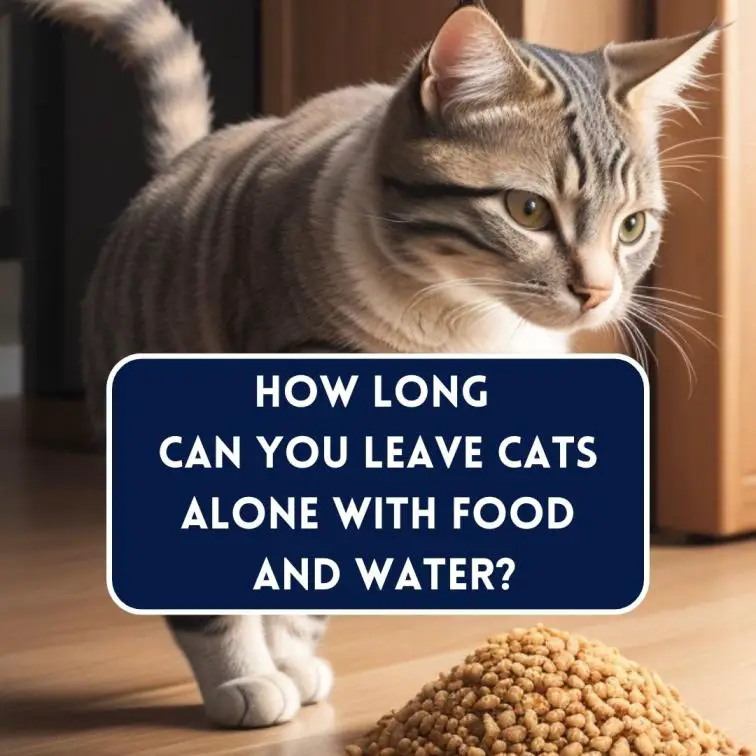In the intricate tapestry of modern life, there come moments when we must temporarily part ways with our cherished feline companions. Be it a quick business trip or an extended family vacation, the query of “How Long Can You Leave Cats Alone with Food and Water?” echoes in the minds of conscientious pet owners. This article ventures into the heart of this matter, unraveling the considerations and strategies that ensure your beloved cat’s well-being during your unavoidable absence. From understanding feline independence to navigating food, water, and care arrangements, we delve into the comprehensive guide that enables you to make informed decisions for your feline friend’s comfort and health.
[This post may contain affiliate links. What does that mean to you? Well, if you click on a product and make a purchase, I may get some compensation from you at no charge. If you want to read the boring stuff my full disclosure can be found here.]
Understanding Cats’ Independence
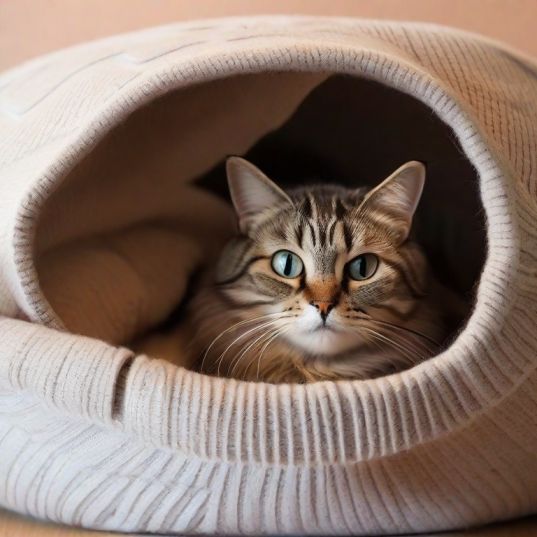
Cats have long captivated our hearts with their enigmatic and independent nature. Unlike their canine counterparts, cats are solitary hunters by nature. This inherent independence equips them to handle short periods of solitude without compromising their well-being. However, it’s important to remember that each cat is unique, and their ability to adapt to being alone can vary based on factors such as age, health, and personality.
Factors to Consider
A. Age of the Cat
Kittens, those bundles of endless curiosity and boundless energy, require considerably more attention and care compared to adult cats. Their need for nurturing, feeding, and supervision is substantial. Adult cats, on the other hand, are generally better equipped to handle brief periods alone. It’s important to remember that kittens need a watchful eye and shouldn’t be left without care for extended periods.
B. Health and Medical Conditions
The health of your cat plays a crucial role in determining how long they can be left alone. Cats with ongoing medical conditions, dietary restrictions, or medication requirements may need regular supervision. Consult your veterinarian before making plans to ensure you meet all your cat’s needs during your absence. Their well-being is paramount.
C. Personality and Socialization
Just as with humans, cats have diverse personalities. Some cats are more independent and comfortable with solitude, while others thrive on companionship and interaction. Consider your cat’s temperament when deciding how long to leave them alone. Social cats may struggle more with extended periods of isolation, while more introverted cats might handle it better.
D. Litter Box Considerations
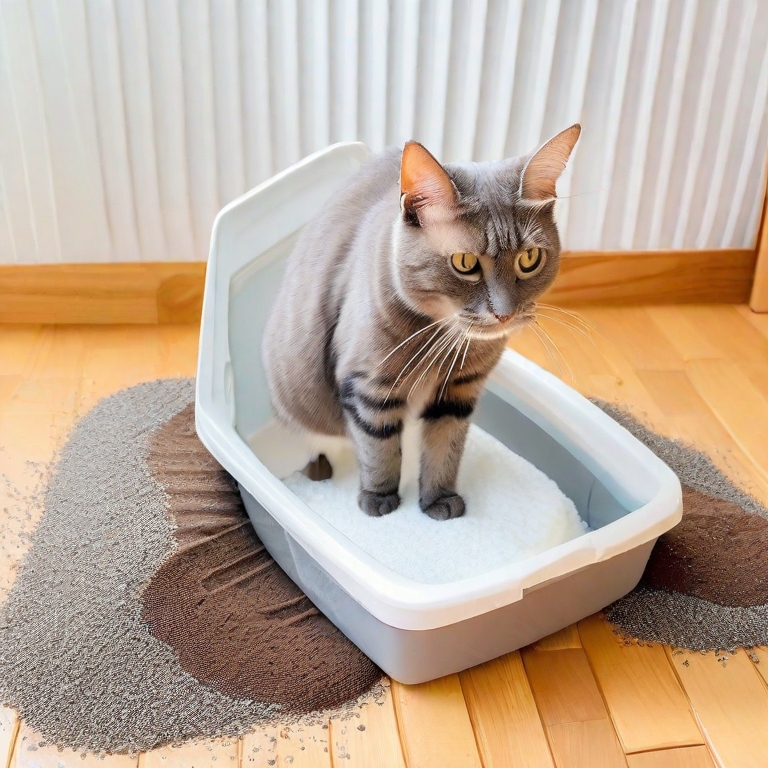
An often overlooked but vital factor is the litter box. Cats are meticulous about their bathroom habits, and a dirty litter box can lead to stress and health issues. Ensure the litter box is clean and well-maintained before you leave, and if you’re going to be away for an extended time, make arrangements for someone to check and clean the litter box as needed.
E. Previous Experience
If your cat has been left alone before, their previous experiences can influence how they handle future periods of solitude. Cats that have had positive experiences of being alone with ample supplies of food and water are more likely to adapt well. Conversely, cats with negative experiences might exhibit anxiety or stress when left alone.
Food and Water Considerations
A. Importance of Adequate Food and Water
Food and water are the cornerstones of your cat’s daily routine. Dehydration and hunger can lead to serious health issues, so ensuring a continuous supply of both is essential. If you’re leaving for an extended period, make sure your cat’s bowls are filled to the brim and provide easy access to fresh water.
B. Automatic Feeders and Water Dispensers
In this age of technological innovation, automated feeders and water dispensers are a godsend for pet owners. These devices can help regulate feeding times and ensure your cat never goes without a meal or a sip of water. Gradually introduce your cat to these devices before your departure to ensure they’re comfortable using them.
C. Dietary Preferences and Special Diets
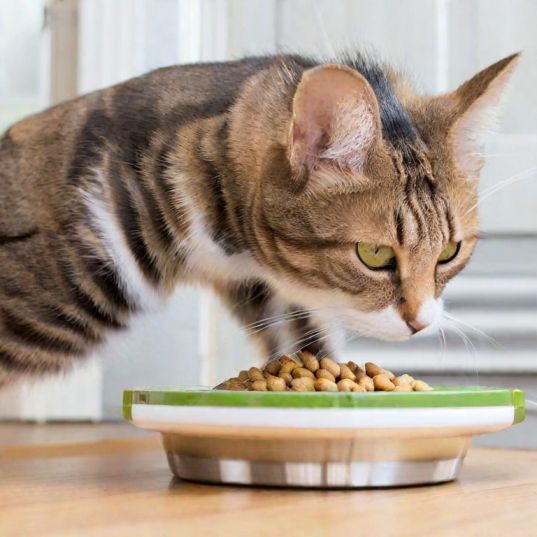
Consider your cat’s dietary preferences and any special dietary needs they might have. Some cats are picky eaters, and being left alone with unfamiliar food could lead to refusal to eat. If your cat has a specific diet due to allergies or sensitivities, ensure you provide the appropriate food to avoid any digestive issues during your absence.
D. Meal Sizes and Portions
When setting up automated feeders, pay attention to the portion sizes. Overeating or undereating can both have negative consequences for your cat’s health. Consult with your veterinarian to determine the right portion sizes based on your cat’s age, weight, and activity level.
E. Monitoring and Adjustment
Even with automated feeders, it’s essential to monitor your cat’s food and water intake remotely if possible. This allows you to ensure they are eating and drinking as expected. If you notice any changes in their consumption, you can adjust the settings or seek assistance to address the issue promptly.
Ideal Duration for Leaving Cats Alone
As much as we’d like a definitive answer, there’s no one-size-fits-all solution to this question. Generally, adult cats can handle being left alone for 24 to 48 hours with sufficient food, water, and a safe environment. However, it’s important to gauge your cat’s comfort level and gradually increase their time alone if necessary.
Read More-
Preparing for Extended Absences
A. Enlisting Help
If your absence extends beyond what your cat is comfortable with, consider enlisting the help of a friend, neighbor, or professional pet sitter. These compassionate caregivers can provide not only food and water but also essential social interaction and playtime.
B. Safe Environment
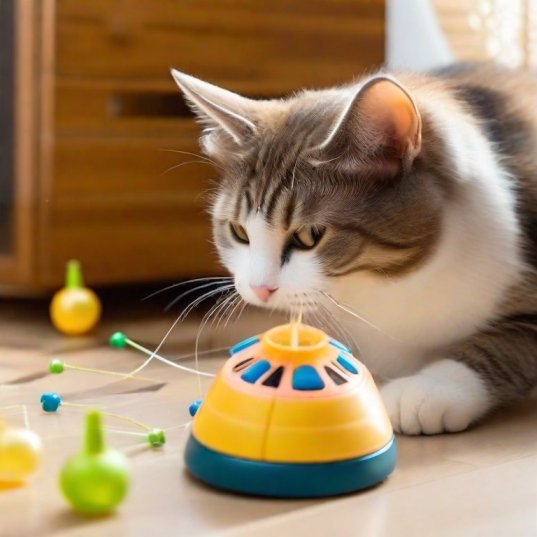
Before you leave, ensure your cat’s surroundings are safe and enriching. Remove any potential hazards, secure windows, and doors, and provide toys or puzzle feeders to keep their minds engaged.
C. Comfort Zones and Hiding Places
Cats often have favorite spots where they feel safe and comfortable. Make sure these spaces are easily accessible and remain undisturbed during your absence. Providing hiding places can help alleviate any anxiety your cat might experience from being alone.
D. Leave a Familiar Scent
Leaving an unwashed piece of your clothing or bedding with your cat can provide a comforting familiar scent. This can help ease any stress or loneliness they might feel in your absence.
E. Provide Entertainment
Leave some interactive toys or puzzle feeders to keep your cat mentally stimulated. This can help prevent boredom and provide a healthy outlet for their natural instincts.
FAQs (Frequently Asked Questions)
1. How long can I leave my cat alone with food and water?
Generally, adult cats can handle 24 to 48 hours of being alone with sufficient food, water, and a safe environment. However, individual cat temperament and needs vary.
2. Can I leave a kitten alone with food and water?
Kittens require more attention and care than adult cats. Leaving a kitten alone for extended periods is not recommended; they need regular feeding, monitoring, and socialization.
3. What if my cat is anxious when left alone?
Leave familiar scents, provide hiding places, and ensure a safe environment to help alleviate anxiety. Professional pet sitters can also offer companionship.
4. How should I prepare my cat for my absence?
Gradually increase the time your cat spends alone. Provide a safe environment, ensure ample food and water, and consider enlisting help if needed.
5. Can I leave my cat alone for 5 days with food and water?
Leaving a cat alone for 5 days isn’t recommended. Cats need social interaction, and prolonged solitude can lead to stress and anxiety. Enlist a reliable friend or pet sitter to check on your cat daily.
6. Is it OK to leave a cat alone for 3 days?
While adult cats can typically manage being alone for 24 to 48 hours, leaving them for 3 days without any human interaction might cause them distress. Arrange for a caregiver to visit and check on them.
7. Can cats stay home alone for 2 weeks?
Two weeks is a long time to leave a cat alone. Even with ample food and water, cats thrive on companionship. It’s best to have a trusted person or professional pet sitter care for them.
8. How long can I leave my cat with a sitter?
Professional pet sitters can care for your cat for an extended period, usually up to a week or longer, depending on their experience and your cat’s needs.
9. Is it okay to leave cats alone for 4 days?
Leaving adult cats alone for 4 days with proper preparations and a reliable caretaker can be manageable. Ensure they have sufficient food, water, and a safe environment.
10. Can I leave my cat alone for 2 days with food and water?
Adult cats can typically manage being alone for 24 to 48 hours with food and water. However, it’s advisable to arrange for someone to check on them and provide companionship.
Conclusion of the topic- How long can you leave cats alone with food and water?
In the realm of responsible pet ownership, leaving your cat alone with food and water requires thoughtful consideration. Understanding your cat’s individual needs, coupled with practical preparations, will help ensure their well-being during your absence. Remember, a well-fed and hydrated cat is a happy and healthy companion. Whether you’re off to work or on a short trip, you can rest assured that with the right preparations, your feline friend will be in good paws.
